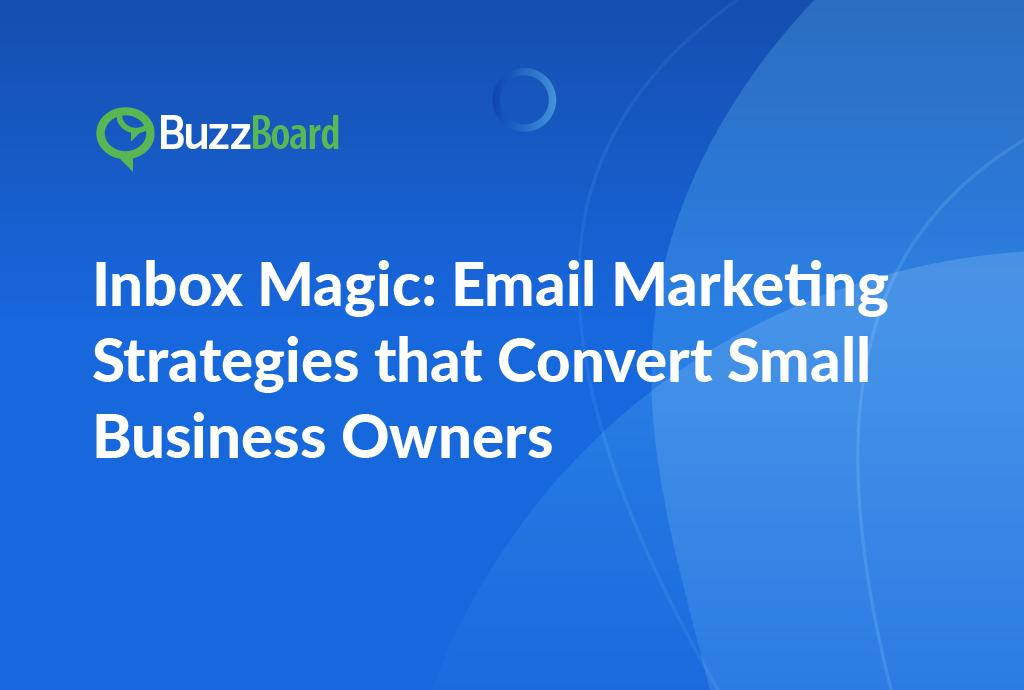Exploring the Potential of Email Marketing for Small Businesses
Tapping into email marketing’s potential can revolutionize small businesses. This strategy is pivotal in nurturing leads, providing an economical medium to connect, engage and effectively convert potential customers. This tool is indispensable for salespeople at digital marketing agencies focusing on local and small businesses looking to streamline their operations.
One fundamental element often overlooked is the power of email subject lines. They serve as the initial point of interaction with the receiver and are crucial in boosting click-through rates. Crafting captivating email subject lines that align with your audience’s desires and interests can significantly increase open rates.
Alongside this, the significance of personalized emails cannot be discounted. Emails customized to each recipient’s tastes and behaviors markedly enhance engagement and conversion rates. Segmentation, which involves dividing your email list into smaller, targeted groups for delivering appropriate and personalized content, is another crucial tactic.
To streamline email marketing for small businesses, incorporating a clear, succinct, and engaging call-to-action (CTA) is crucial. CTAs guide recipients toward the intended action, like exploring a website, subscribing to a newsletter, or purchasing a product.
Automation tools simplify these tasks, triggering emails based on customer behavior or time periods. This method not only saves time and effort but also delivers superior results due to precise targeting and timing.
To delve deeper into email marketing for small businesses, click (insert link here).
[Sources: (External links as required)]
How Email Subject Lines and Personalization Contribute to Successful Conversions
Email marketing remains a viable strategy for small businesses to engage their target audience, cultivate leads and drive conversions. A critical element of successful email marketing lies in the implementation of efficient subject lines and personalization techniques. Bear in mind, your recipient’s first encounter is the subject line. If it’s unappealing, they may not even open the email.
Conversely, personalized emails strive to deliver more pertinent, targeted content to your subscribers, thereby increasing their interaction with your brand. Segmentation of your email list enhances personalization by categorizing your audience based on behaviors, interests or demographics, thus supplying them with content tailored to their specific needs.
Don’t underestimate the effectiveness of a robust call to action (CTA). A thoughtfully crafted CTA can substantially boost your click-through and conversion rates.
Luckily, several automation tools are available to simplify tasks like generating enticing subject lines, personalizing content, segmenting your audience and creating compelling CTAs. With these automation tools, small businesses can optimize their email marketing, yielding improved results without additional resource allocation.
By combining content creativity, lead nurturing strategies and advanced software, email marketing can offer significant returns for small businesses, driving successful conversions and establishing lasting customer relationships.
Explore [URL HERE] for more insights into email marketing practices for small businesses. For information about advanced email marketing automation tools to enhance your business performance, explore [URL URL HERE]. To effectively segment your email list, check out [HYPERLINK URL HERE].
Begin your successful email marketing journey today. Discover more with [YOUR BRAND].
Importance of Lead Nurturing and Segmentation in Email Marketing
The impact of email marketing on small businesses is unequivocal. It provides an affordable and highly effective medium for reaching customers and nurturing leads. That being said, the effect can be significantly amplified with the strategic use of lead nurturing and segmentation.
Lead nurturing is a vital element of the process, guiding prospects down the sales funnel with timely and relevant information. This doesn’t mean bombarding leads with an inundation of emails. Rather, it’s about crafting personalized emails reflecting their unique needs and current stage in the buyer’s journey. Constructing catchy email subject lines that spark interest and curiosity can drastically improve open rates, keeping your business at the forefront of busy customers.
On the other hand, segmentation enables you to categorize your audience based on particular criteria: demographics, past purchasing behavior, engagement and more. Segmented lists guarantee customized messaging, thus significantly enhancing relevance and, as a result, response rates. This ultimately strengthens customer relationships and encourages loyalty.
These strategies can be coupled powerfully using automation tools. Automation not only heightens efficiency but also enables A/B testing – fostering an environment of continuous enhancement.
It’s important to remember that each interaction stage should include a well-positioned, captivating call to action to maintain customer engagement and guide them toward a purchasing decision.
Sales agents at digital marketing agencies, I encourage you to delve further [Link] into ways to improve your email marketing strategy. And don’t forget to share these insights at your next strategy session [Share Link].
Your ability to successfully implement these email marketing approaches can be a game-changer for small businesses. It not only allows you to deliver value to your clients but also contributes to the growth and success of their business.
Incorporating Effective Call-To-Action Strategies in Email Campaigns
In today’s digital sphere, email marketing continues to be an impactful tool for small businesses keen on nurturing customer relationships and boosting conversions. However, capitalizing on these opportunities hinges on incorporating an efficacious call-to-action (CTA) strategy.
Almost every email marketing campaign launches with a tantalizing email subject line. After all, this is your initial interaction with prospective leads. It must spark curiosity and stimulate them to open your email — the primary step in the lead nurturing process.
After piquing their interest, your email content should further engage the recipient. An effective way to accomplish this is through email personalization. By addressing the recipient using their name or reflecting on their past interactions with your business, you can facilitate a strong drive toward your CTA.
To enhance the efficacy, wrap your CTAs around segmentation. Your subscribers don’t all necessitate the same nudge. Segment your users based on demographic and behavioral data, tailoring your CTAs accordingly. Use phrases and action words that resonate with each segment. In this manner, segmentation can considerably bolster your lead nurturing efforts.
Automation tools can further augment this process. They not only alleviate the tedious task that comes with segmentation but also assist in delivering personalized emails consistently and tracking the performance of your CTAs in real-time.
A meticulously planned and implemented call-to-action strategy can significantly enhance your email marketing campaigns. While it may appear intricate at first glance, harnessing the power of automation tools, coupled with strategic efforts toward email personalization and segmentation, can reap substantial rewards.
Discover these [email automation tools](hyperlink) for your business, and start maximizing your email marketing efforts today.
The Role of Automation Tools in Enhancing Email Marketing Efficacy
The importance of email marketing for small businesses can’t be overstated. But, how can they truly harness its many benefits? The answer is simple – by leveraging automation tools designed to manage, organize, and enhance email marketing campaigns.
Email marketing encompasses several strategies such as crafting compelling subject lines, personalizing emails, nurturing leads, segmenting audiences, and creating persuasive calls to action. Automation tools can deftly handle these tasks, enabling more profound engagement with your audience. For example, they assist in creating enticing subject lines that captivate readers and compel them to open emails.
Personalizing emails enables your message to resonate with your audience on an individual level. Audience segmentation enhances targeting precision by dividing your audience into groups based on behavior, interests, and demographics. Lead nurturing involves building and strengthening relationships with potential customers throughout their buying journey. Finally, a compelling call to action in the email smoothly guides the reader towards what you want them to do, easing the conversion process.
Automation tools simplify these complex tasks, taking over manual processes, and delivering consistent and accurate results. Basically, they are the catalysts fueling the success of your email marketing initiatives. Whether your agency provides comprehensive marketing solutions or specializes in areas like email marketing, automation tools can help you deliver superior results to your small business clients.
Explore how automation tools can transform your email marketing strategies [here](#).
For more insights on effective email marketing for smaller businesses, visit [this link](#).








